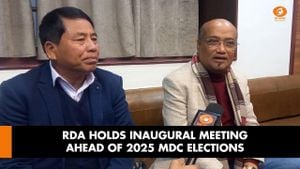The Vietnamese Communist Party is currently embarking on significant reforms aimed at enhancing the quality and effectiveness of political theory training for its leaders and members. At the forefront of these efforts is the Thọ Xuân District Political Center, which has committed to developing programs focusing on practical applications of political knowledge, ensuring participants can effectively integrate theory with real-world challenges.
The importance of these initiatives cannot be overstated. Improved political training is seen as key to not only uplifting the leadership capabilities of party members but also increasing the overall combat effectiveness of party organizations. The need for such training is underlined by the Central Committee's conclusions, particularly Decision No. 121-KL/TW, which emphasizes the necessity for political organizations to be responsive and adaptable.
Currently, the center boasts three full-time faculty members and seven adjunct instructors who play integral roles in transforming the training curriculum. This transformation process emphasizes updating educational practices and introducing innovative teaching methods. Addressing the center's commitment, Lê Văn Tiến, Director of the Thọ Xuân District Political Center, explained, "To improve the quality of political theory training, the center will continue to stay aligned with the political tasks of the district and work closely with local mass organizations and party structures to develop training programs relevant to our reality."
One of the standout features of the center's training initiatives is its focus on connecting theoretical knowledge with practical experiences. For example, faculty members frequently explore creative teaching methodologies to engage students more actively. Instead of solely relying on traditional lectures, instructors incorporate various formats, such as multimedia presentations and interactive discussions, to illuminate political concepts. This shift not only enriches the learning experience but also fosters greater student involvement.
The training center has also embraced technology, utilizing digital resources as part of its teaching strategy. Lê Văn Tiến remarked, "The center's faculty employs innovative educational techniques and integrates applied technology to make lessons more engaging and relevant." By digitizing training materials, students can easily access, share, and interact with course content, creating opportunities for collaborative learning and active engagement.
Specific training programs have been set up for different groups within the political ranks, with courses catering to local needs and priorities. For example, from the beginning of 2024, the center is partnering with the provincial Political School to offer training sessions for various levels of party members. This includes courses like intermediate-level political theory training for 73 participants and entry-level courses for 93 students, ensuring diverse training avenues for all cadres.
Over the past year, the center has also successfully conducted specialized courses aimed at enhancing the organizational skills of newly inducted party members. During this time, over 1,200 individuals participated across 11 core workshops, alongside 15 specialized courses aimed at bolstering skills across various domains, including community organizing and engagement.
One remarkable achievement of the center is the broadening of educational access. Special training sessions have been extended to high school students, recognizing the importance of early political education. These classes, conducted on weekends, allow students to balance their academic commitments with political training opportunities. This proactive approach ensures the youth are well-informed and engaged from early on, fostering future civic leaders.
Continuous feedback mechanisms are also put in place to monitor the effectiveness of training procedures. The center has established various assessment formats, such as open-ended exam questions linked directly to real-world scenarios, stimulating students' creativity and independent thinking abilities. Through regular surveys and feedback, they can adjust programs based on student needs and interests as well.
These comprehensive reforms signify not only the dedication of the Thọ Xuân District Political Center to improve training but also reflect the broader objectives of the Vietnamese Communist Party in preparing its personnel for effective governance and leadership. With these enhancements, the expectations are clear: to cultivate knowledgeable, capable, and engaged leaders who can adeptly navigate the complex socio-political environment of Vietnam today.
By continually adapting its education methods and dedicated focus on practical applications, the center positions itself as a model for similar initiatives across the nation. Looking forward, the emphasis remains on innovation, active learning, and collaboration among local political organizations as they seek to empower the next generation of leaders.



